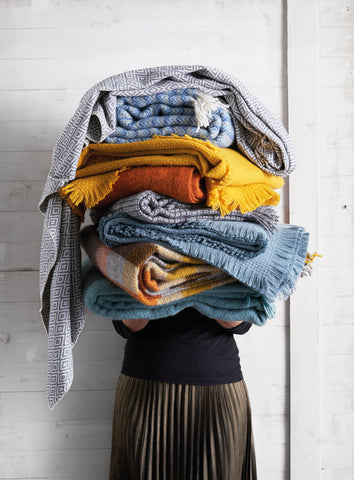our history
Klippan Yllefabrik AB dates back to the 19th century, but is still more modern than ever. Here, a decision was made early on to focus on natural materials, sustainability and high quality. The company, which is run by the fourth and fifth generations, is strongly associated with warm, comfortable woolen blankets in lovely patterns and colors. Come along and feel the beat of history.
Everything started on a modest scale on Järnvägsgatan in Klippan, in 1879. It was then that Jöns Petter Magnusson (1857-1944) , a trained spinning master born in Landskrona, took over a small wool spinning mill. To this day, the family business Klippan Yllefabrik AB remains at the same address in Klippan, Scania. History is very much alive and the knowledge that has followed generation after generation sits in the walls.

A difficult time awaited Jöns Petter and his wife Matilda. They had only three employees to help them and the spinning machine itself was hand-operated. At times the couple worked both day and night, but success was not lacking. After a few years, the entire fleet had been renewed and Matilda was able to open a shop on Järnvägsgatan.
Jöns Petter was succeeded in 1910 by his son Gustaf Magnusson (1888-1918 ). He had learned to dye yarn in Leverkusen and soon came to supplement the spinning mill with a dyeing mill. He also made contact with the burgeoning Swedish handicraft movement and thus gained a nationwide clientele. During the short time that Gustaf was active, the production capacity tripled. Unfortunately, he died of the Spanish flu in 1918, aged only 30. His widow Greta was then the sole owner of a factory, while she had two small children and a third on the way. Greta hired Gustaf's brother-in-law; Ivar Sjunnesson, to run the spinning mill while waiting for the children to grow up. Klippan Yllefabrik now entered a more managerial phase.

In 1947 it was time for the third generation Magnusson to take office. Sven Magnusson (1919-1982) took over the business at the age of 28. He was Gustaf's youngest child and not even born when his father passed away. His education was early on focused on a future within the company and he studied to become a textile engineer in Norrköping, which at the time was the center of wool manufacturing in Sweden. Times were good and during Sven's 35 years, the capacity of the spinning mill increased 20-fold. Extensive rationalizations and modernizations were carried out and, among other things, a completely new spinning mill was built a few kilometers outside of central Klippan. Remaining on Järnvägsgatan was the paint shop and some finishing. At the time of Sven's death in 1982, Kippan Yllefabrik was considered Scandinavia's most modern spinning mill. It was also the fourth largest wool spinning mill in Sweden and the number of employees amounted to just over 90. The business consisted of spinning, dyeing and supplying woolen yarn on a large scale, both to industry and private individuals.

The 1980s were a turbulent time. Sven's son, Gösta Magnusson (1947) , had to deal with reduced demand and increased competition from abroad. The company was forced to take drastic measures with repeated cutbacks. At the end of the decade, Klippan Yllefabrik was one of the few spinning mills left in Sweden and the number of employees had decreased to 30 people. The turning point came in 1992 when Gösta got in touch with a spinning and weaving mill in Latvia, whose specialty was woolen blankets. In Klippan, the decision was made to invest wholeheartedly in this product. The step to create your own products from the material you mastered best, i.e. wool, felt natural. Previously, the yarn had been left to others to create from. The sale of plaids grew steadily and in 1997 the company in Riga was bought by Klippan Yllefabrik.


In 2003 , the fifth generation, Pernilla Roos and Petter Magnusson , joined the family business as product developer and financial manager respectively. Gösta remained as CEO until 2012. Even today, it is Gösta who is responsible for the traceability of the material and, with his experience, buys wool of the right quality. Under Pernilla and Petter's leadership, both the range and sales have developed strongly. This has led to substantial growth, not least outside Sweden's borders.

Klippan Textil as a group today consists of two operating companies, Klippan Yllefabrik AB with operations in Sweden and Klippan-Saule with operations in Latvia. Klippan houses product development, distribution and marketing. All production takes place at the unit in Latvia.

Quick facts about Klippan Yllefabrik
- Founded in 1879 in Klippan in Scania, where the company still has its headquarters, warehouse and factory store today.
- Run today by the fourth and fifth generation.
- Everything from the purchase of raw materials to the finished end product takes place in-house, which provides full traceability.
- We always use natural materials and choose organic alternatives as much as possible.
- The blankets are manufactured from start to finish in our own factory in Riga, Latvia.
- About 600,000 plaids are produced annually, which corresponds to wool from 300,000 sheep.
- 50% of sales are exports. We sell to around 30 different countries and to all continents with the exception of Africa.
- Our products are sold at more than 600 retailers around Sweden as well as via our own webshop.
- In Klippan, there is a factory store with both the regular range and an outlet.
- In addition to throws and blankets, home textiles such as pillow cases, aprons, towels and more are also manufactured.
- At Klippan Yllefabrik, we are constantly working to develop our product range under the common denominator of unique design and good quality.



